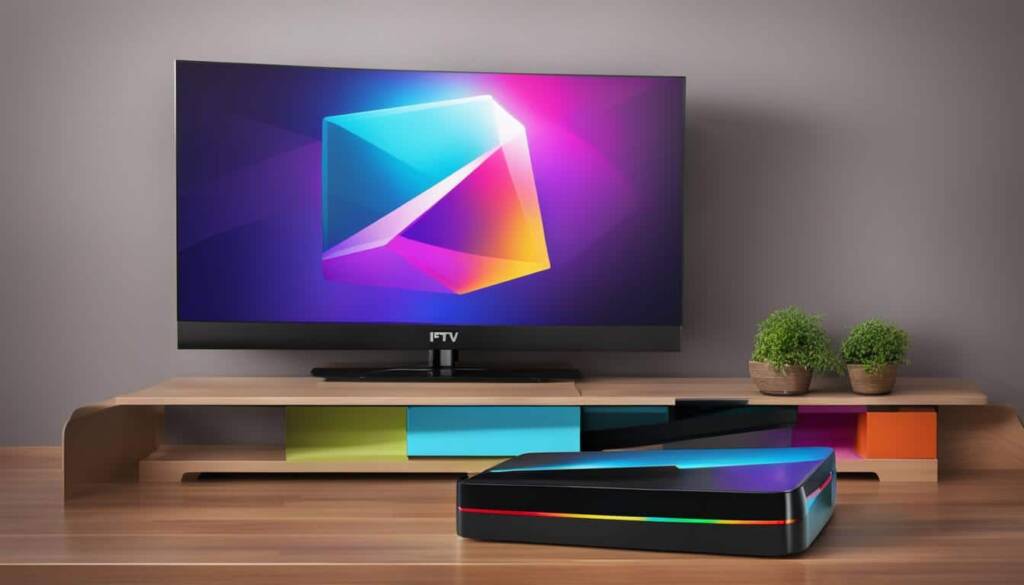Table of Contents
Welcome to our comprehensive guide on IPTV box and its role in the world of internet protocol television. In today’s digital era, where on-demand content is king, IPTV has emerged as a revolutionary technology that offers an unparalleled viewing experience.
IPTV, or internet protocol television, allows viewers to watch their favorite shows, movies, and videos seamlessly on their TV screens and other devices using the power of the internet. With IPTV, the limitations of traditional TV are shattered, as it provides the flexibility to watch content anytime and anywhere.
An IPTV box plays a crucial role in this whole ecosystem by converting internet protocol signals into a TV-readable format. It acts as a bridge between your television and the vast world of IPTV content. The box can be connected to your TV using HDMI cables, AV cables, or even wirelessly through Wi-Fi.
One of the key advancements in IPTV is hybrid IPTV, which combines the benefits of traditional TV with IP-based TV. This hybrid approach ensures a more reliable and consistent viewing experience for users.
IPTV offers various types of content formats, including live TV, video on demand (VOD), and time-shifted TV. This means you can not only watch your favorite shows in real-time but also catch up on missed episodes or explore a vast library of on-demand content at your convenience.
The advantages of IPTV are immense. With its higher quality content and global reach, IPTV has become a preferred choice for many viewers. Additionally, IPTV opens up new possibilities for advertising revenue, presenting opportunities for businesses to engage with their target audiences in a unique way.
However, like any technology, IPTV does face its fair share of challenges. Sensitivity to packet loss, limitations of legacy networks, and competition with traditional TV providers are among the hurdles that the industry must overcome.
It is essential to consider the wide variety of IPTV providers available and the regulatory and legal considerations associated with IPTV services. This ensures a seamless and enjoyable viewing experience while adhering to the necessary guidelines and regulations.
Now that we have laid the foundation, let’s delve deeper into how IPTV works and unlocks a world of endless entertainment possibilities.
How Does IPTV Work?
IPTV, short for internet protocol television, is a technology that enables the delivery of TV programs and videos over an internet protocol network. This innovative approach to content delivery is revolutionizing the way people consume television content. But how exactly does IPTV work?
Content providers play a crucial role in the IPTV ecosystem. They convert their media, such as TV shows or movies, into IP packets and store them on dedicated servers. These IP packets contain the audio, video, and data necessary to deliver the content to viewers.
When a user requests specific content, the IPTV provider retrieves the corresponding IP packets from the server and dispatches them to the user’s device. This process ensures that users receive the content they want in a seamless and efficient manner.
IPTV employs two main methods to deliver content to viewers: IP multicasting and unicast streaming. IP multicasting allows content to be sent to multiple devices simultaneously, decreasing network bandwidth usage. On the other hand, unicast streaming delivers content individually to each device, ensuring a personalized experience.
To display IPTV content on a television, users typically require a set-top box (STB). This device decodes and decrypts the IPTV streams, converting them into a format that the TV can display. The STB also provides additional features, such as interactive program guides and video on demand functionality.
IPTV can be delivered over a managed or dedicated network, offering control over quality of service, uptime, bandwidth, and reliability. This enables IPTV providers to ensure a smooth and high-quality viewing experience for their subscribers.
Furthermore, IPTV can be bundled with other IP-based services, such as voice over IP (VoIP) and high-speed internet, providing users with a comprehensive telecommunications solution.
With IPTV, viewers can enjoy personalized and on-demand viewing experiences. They have the freedom to choose which content they want to watch and when they want to watch it. This flexibility and convenience make IPTV a popular choice among those looking to break free from the limitations of traditional broadcasting.
The Role of IPTV Providers
IPTV providers are key players in the IPTV ecosystem. They are responsible for delivering the IP packets containing the desired content to users’ devices. IPTV providers invest in robust infrastructure, including servers and network equipment, to ensure the reliable and efficient delivery of content.
Through partnerships with content providers, IPTV providers offer a wide range of channels and on-demand content to cater to diverse viewer preferences. They also handle customer support, billing, and other administrative tasks to provide a seamless user experience.
In addition to delivering content, IPTV providers play a vital role in ensuring the security of the IPTV ecosystem. They employ encryption and authentication mechanisms to protect content from unauthorized access and piracy.
By continuously evolving and innovating their services, IPTV providers contribute to the growth and advancement of the IPTV industry. They strive to offer new features and technologies that enhance the viewing experience and keep viewers engaged.
Regulatory and Legal Considerations
As with any form of media distribution, IPTV operates within a legal and regulatory framework. IPTV providers must comply with copyright laws and licensing agreements to ensure that they have the necessary rights to distribute content to viewers.
Regulatory bodies and authorities may impose certain restrictions or requirements on IPTV providers to protect consumer rights and promote fair competition. These regulations help maintain a level playing field and ensure that viewers have access to high-quality and legally obtained content.
IPTV providers need to stay informed about the evolving regulatory landscape and adapt their practices accordingly. This ensures that they operate within the boundaries of the law and provide a trustworthy and reliable service to their subscribers.
The Future of IPTV Solutions
The future of IPTV solutions looks promising, driven by the increasing popularity of streaming services and the growing demand for personalized and on-demand content. As internet protocol television continues to evolve and innovate, it offers new features and technologies to enhance the viewing experience.
One key factor attracting viewers to IPTV services is the availability of high-quality content, including 4K and HDR resolutions. This enables users to enjoy immersive and visually stunning viewing experiences. Additionally, IPTV services often offer private network delivery, which improves security and reliability, making IPTV a preferred choice for consumers.
With its global reach, IPTV has the capability to deliver content to a diverse audience worldwide. This allows for the expansion of entertainment options and brings people closer to their favorite shows and movies irrespective of their geographical location.
The market for IPTV is experiencing rapid growth, fueled by the rising popularity of streaming services. However, there are challenges that need to be addressed, such as sensitivity to packet loss, delays, legacy network limitations, and regulatory and legal considerations.
To meet the growing demand for IPTV services, providers need to invest in network improvements and advanced technologies. Furthermore, competition with traditional TV providers provides opportunities for IPTV services to offer unique value propositions and attract users away from traditional options.
The revolutionizing impact of IPTV is reshaping the future of the entertainment industry, allowing individuals to enjoy interactive TV experiences, on-demand content, and seamless streaming. With the continuous advancements in technology, IPTV is poised to transform the way we watch television.
FAQ
What is an IPTV box?
An IPTV box is a device that converts internet protocol signals into a TV-readable format, allowing users to access IPTV content on their televisions.
How does IPTV work?
IPTV delivers TV programs and videos over an internet protocol network. Content providers convert their media into IP packets and store them on servers. When users request specific content, the IPTV provider fetches and dispatches the necessary IP packets to the user’s device.
What are the different types of IPTV formats?
IPTV includes live TV, video on demand (VOD), and time-shifted TV formats.
What advantages does IPTV offer?
IPTV provides higher quality content, a global reach, and potential for advertising revenue.
What challenges does IPTV face?
IPTV is sensitive to packet loss and may face legacy network limitations. It also competes with traditional TV providers.
How can IPTV be delivered?
IPTV can be delivered over a managed or dedicated network, ensuring control over quality of service, uptime, bandwidth, and reliability.
Can IPTV be bundled with other services?
Yes, IPTV can be bundled with other IP-based services like voice over IP and high-speed internet, offering a comprehensive telecommunications solution.
What is the future of IPTV solutions?
The future of IPTV looks promising, with the increasing popularity of streaming services and the demand for personalized and on-demand content. IPTV continues to evolve and innovate, offering new features and technologies to enhance the viewing experience.












